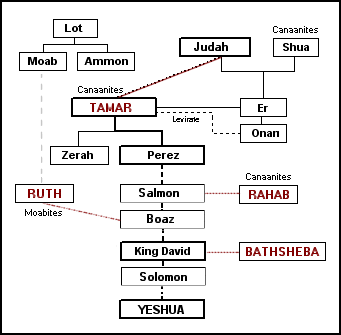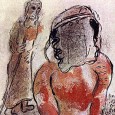|
This week's Torah portion includes the rather unseemly account of Judah's union with his Canaanite daughter-in-law, Tamar (תָּמָר). The various Jewish commentators wondered why this narrative was inserted into the midst of the story of Joseph and his brothers. After all, the continuity of the Joseph story is clearly seen by simply skipping over chapter 38, so the question naturally arises as to why the story of Judah and Tamar was parenthetically placed here in the Torah portion. According to the Malbim, the story of Judah represents the axiom that "God creates the cure before the plague." Since the sale of Joseph led to the Egyptian exile (which is considered the paradigm of all exiles), it was necessary to plant the roots of ultimate redemption before the exile began. Thus before the "new Pharaoh" was born who would enslave Israel, the line of the Messiah, Israel's Deliverer and Redeemer, was further determined.
The "planting of this seed" came about in an unusual way, however. Recall that Judah had married a Canaanite woman named Shua (שׁוּעַ) who bore him three sons: Er, Onan, and Shelach (Gen. 38:2-5). After the boys had grown up, Judah arranged a marriage between Tamar with his firstborn son (Gen. 38:6). Er, however, was "wicked" in the sight of the LORD and God put him to death (the Torah does not state the nature of his wickedness, though a midrash states that Er did not want Tamar to get pregnant in order to preserve her beauty). At any rate, according to the custom of "Levirate marriage" (yibbum), Judah commanded his son Onan to "perform the duty of the brother-in-law to her" by producing an heir on behalf of his deceased brother. Now while Onan agreed to marry Tamar, he deliberately practiced a form of "birth control" that prevented the birth of his brother's heir. For this reason, the LORD put him to death as well. Judah was now without an appointed heir, and the entire lineage of his tribe was at jeopardy. He was reluctant, however, to give his third son marry Tamar, since were he to die, the lineage of Judah might end with his own death (Gen. 38:11). Perhaps it was because of this fear that he (misleadingly) promised Tamar that he would give his remaining son to her only after he "came of age."
Time went by, and soon Tamar realized that Judah was not going to fulfill his promise to give his son Shelach in marriage to her. Sometime after the death of his wife Shua, Judah went to visit his friend Hirah the Adullamite to sheer sheep. Upon hearing this, Tamar disguised herself as a prostitute and seduced him while he was on the road to Timnah. From this illicit union Tamar bore twin boys (Zerach and Perez), and from the line of Perez (פָּרֶץ, lit. "bursting forth" or "breakthrough") would descend King David - and ultimately Yeshua our Messiah Himself...
King David's genealogy not only included Abraham/Sarah, Isaac/Rebekah and Jacob/Leah, of course, but it also included Judah/Tamar, Boaz/Ruth, and Salmon/Rahab. It is interesting to note that in the genealogy of Yeshua given in Matthew (1:1-16), only four women (besides Mary) are explicitly named: Tamar (who seduced her father-in-law), Rahab (a prostitute), Ruth (a Moabitess), and "the wife of Uriah" (i.e., Bathsheba, an adulteress). Here is a (very simplified) diagram I made to indicate some of the relationships:
 |
And now for your Torah question of the day: What spiritual characteristic(s) do you think united these four women? (see Ruth 1:16; 4:12; 1 Kings 1:13-31; Heb. 11:31; James 2:25). The blessing given to Boaz, "May your house be like the house of Perez, whom Tamar bore to Judah, because of the offspring that the Lord will give you by this young woman" (Ruth 4:12), suggests that God's plan of blessing providentially overcame the weakness and frailty of all the people involved... It is encouraging, is it not, that no matter what your personal background, God can use you to accomplish His will...
Praise the LORD that His salvation "burst forth"!
|



